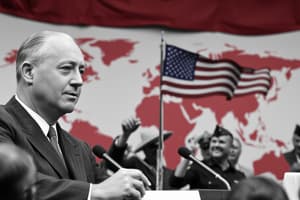Podcast
Questions and Answers
What is the definition of Neutrality?
What is the definition of Neutrality?
- A treaty between two countries
- A foreign policy position to remain neutral and not take sides (correct)
- National policy of avoiding foreign trade
- A policy of extending rule over foreign countries
What does Isolationism refer to?
What does Isolationism refer to?
- Trade agreements with other nations
- Involvement in foreign conflicts
- Strengthening defense alliances
- A national policy of avoiding political or economic entanglements (correct)
What results in National Debt?
What results in National Debt?
Money owed to foreign countries.
What caused inflation after the Revolution?
What caused inflation after the Revolution?
What was a major issue with the Articles of Confederation?
What was a major issue with the Articles of Confederation?
What event took place in Philadelphia in 1787?
What event took place in Philadelphia in 1787?
What is the significance of the Constitution?
What is the significance of the Constitution?
Who was the commander in chief of the Continental Army?
Who was the commander in chief of the Continental Army?
What did George Washington NOT want to get involved in?
What did George Washington NOT want to get involved in?
What was the purpose of tariffs as described?
What was the purpose of tariffs as described?
Who tried to implement economic warfare against Great Britain?
Who tried to implement economic warfare against Great Britain?
The _____ Acts were passed instead of Madison's economic measures.
The _____ Acts were passed instead of Madison's economic measures.
What was Alexander Hamilton's goal regarding national debt?
What was Alexander Hamilton's goal regarding national debt?
What did the French Revolution seek to emulate?
What did the French Revolution seek to emulate?
Who was Edward Genet?
Who was Edward Genet?
What did George Washington state in his Proclamation of Neutrality?
What did George Washington state in his Proclamation of Neutrality?
What did the Neutrality Act make illegal?
What did the Neutrality Act make illegal?
What was the outcome of France opening colonial trade?
What was the outcome of France opening colonial trade?
What does Jay's Treaty state about US ships?
What does Jay's Treaty state about US ships?
What did Washington warn against in his Farewell Address?
What did Washington warn against in his Farewell Address?
What marked the 20th century socio-political movement led by Woodrow Wilson?
What marked the 20th century socio-political movement led by Woodrow Wilson?
What does the 'New Era' refer to?
What does the 'New Era' refer to?
What is Direct Imperialism?
What is Direct Imperialism?
Flashcards are hidden until you start studying
Study Notes
Neutrality and Foreign Policy
- Neutrality signifies a foreign policy aimed at avoiding involvement in conflicts or wars between other nations.
- Isolationism emphasizes the avoidance of political and economic relationships with foreign countries.
Economic Context Post-Revolution
- National Debt emerged following the American Revolution, chiefly owed to foreign nations like France.
- Inflation resulted from wartime supply demands, leading to unchecked price increases not matched by wage growth.
Articles of Confederation
- The Articles granted excessive power to individual states, crippling the federal government's ability to conduct treaties and regulate commerce.
- Congress lacked the authority to impose tariffs, undermining economic unity.
Constitutional Convention
- Convened in Philadelphia in 1787, this assembly was tasked with drafting the Constitution and led by George Washington.
- The resulting Constitution replaced the Articles of Confederation and allowed Congress to tax, regulate commerce, and raise armed forces.
Key Figures in American Governance
- George Washington served as the commander-in-chief of the Continental Army during the Revolution, later prioritizing national governance to preserve liberty and promote unity.
- Alexander Hamilton focused on economic recovery by reducing national debt, promoting industry, and supporting the excise tax.
Economic Policies
- Tariffs were utilized to raise revenue and strategically target foreign nations lacking commercial treaties.
- The Tonnage Acts replaced James Madison's failed attempt to impose punitive tariffs on Great Britain.
Foreign Relations
- The French Revolution ignited questions of U.S. involvement, with Washington advocating for neutrality to safeguard trade with Great Britain.
- Edward Genet, France's ambassador, encouraged U.S. involvement against British interests, contrary to Washington's stance.
Neutrality Legislation
- In 1793, Washington issued the Proclamation of Neutrality, asserting that the U.S. would not take sides in the French Revolution.
- The Neutrality Act prohibited Americans from waging war against peaceful nations and restricted foreign war vessels in U.S. waters.
British-American Tensions
- The British blockade against France impacted American shipping, with merchants capitalizing on new trade opportunities.
- Jay's Treaty defined U.S.-British relations, allowing limited harassment of U.S. ships while affirming compensation for losses.
Washington's Farewell Address
- Promoted unity and cautioned against partisan divisions, advocating for neutrality in international relations and suggesting isolationism as the best approach.
Rise of Progressivism
- Woodrow Wilson's era marked a shift towards addressing social and political reforms, including labor rights, women's suffrage, and a move away from imperialistic policies toward self-determination.
Imperialism and Its Definitions
- Imperialism reflects a nation's expansion and dominance over foreign territories, while direct imperialism denotes complete control over colonies.
Studying That Suits You
Use AI to generate personalized quizzes and flashcards to suit your learning preferences.




